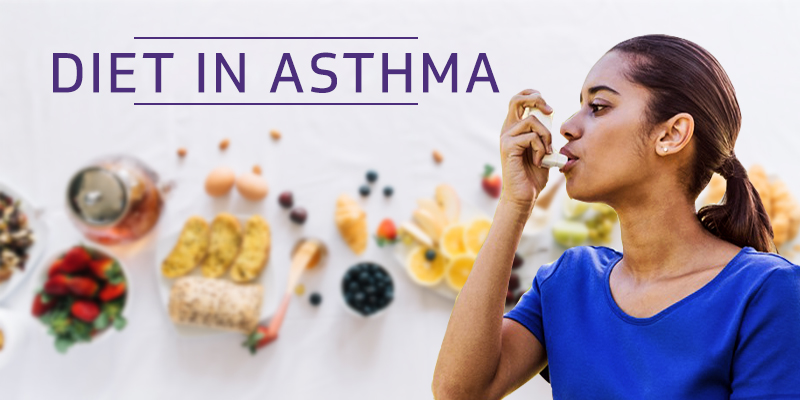
Asthma is an inflammatory disease of the lungs. It makes breathing difficult and brings on attacks of coughing, wheezing, tightness in the chest and shortness of breath. These symptoms may occur a few times in a day or a few times every week. Depending on the case, the asthma symptoms may become worse at night or with exercise.
It is usually caused by a combination of genetic and environmental factors. Environmental factors include exposure to air pollution and allergens like dust, pollen, mold, pet dander etc. Other potential triggers include medications such as aspirin and beta-blockers. Although there is no cure for asthma, symptoms can be prevented by avoiding triggers, such as allergens and irritants, and by using inhaled corticosteroids.
There is no asthma diet that can eliminate your symptom, but these steps may help:
Foods To Be Included:
- Eat to maintain a healthy weight. Being overweight can worsen your asthma. Even losing a little weight can improve your symptoms.
- Diets rich in Magnesium, Omega 3 fatty acids, Vitamin C, D, E, Beta-carotene, flavonoids are associated with lower rates of asthma attacks.
- Eat plenty of fruits and vegetables. They are a good source of antioxidants such as beta-carotene, vitamins C, E etc. which may help reduce the inflammation in lungs caused by cell-damaging chemicals known as free radicals.
- Apples have a flavonoid compound Khellin that helps in preventing inflammation
- Banana is rich in fibre, potassium and antioxidants that improve lung function and decreases wheezing in children.
- Berries and pomegranates are rich in antioxidants
- Beta-carotene or vitamin A-rich foods reduce exercise-induced asthma
- Citrus fruits like grapes, kiwi, broccoli, Brussels, sprouts, cantaloupe, spinach, dark chocolate, salmon and pumpkin seeds are rich in magnesium. This helps in lung flow and volume.
- Avocado is rich in MUFA and helps lower cholesterol. Also contains the antioxidant glutathione
- Ginger has a compound called curcumin that dilates the air passages
- Kale is rich in Vitamin C, K, A, C, D, Manganese and more
- Spinach has Vit C, Beta-carotene, Vit E, potassium, zinc, iron, magnesium, calcium
- Nuts are rich in Vitamin E. Almonds and hazelnuts have tocopherol that helps in cough and wheeze
- Flaxseeds relax muscles surrounding the bronchi and keep airways open
- Vitamin D rich foods and Vit D fortified foods strengthen the immune system. Milk, eggs, salmon, and even spending time outdoors in the sun increase Vit D levels
- Coffee or caffeinated drinks open up airways up to 4 hours after consumption
Practice Eating Everyday:
- Eat 1 banana a day
- One glass of apple juice a day
- Fresh salads and fruits with spinach, tomatoes, kale, avocado, cantaloupe, pomegranate, lettuce, sweet potatoes, carrots, green leafy vegetables etc.
- Crush 3 cloves of garlic. Add 2 glasses of water. Boil until 1 cup is left. Cool and drink
- Grate 1 tbsp of ginger. Add 1 glass of water. Boil. Reduce to half glass. Add 1 tbsp of honey and drink
- Mix 1 tbsp of honey in warm water and drink
- Mix 1/2 tbsp of cinnamon and 3 tbsp honey and 1 tbsp lemon juice. Mix well and drink
Foods To Avoid:
- Avoid allergy-triggering foods like peanuts, eggs and milk (only if you have a known allergy towards these)
- Nuts in case of nut allergy
- Milk and milk products in case of milk allergy or lactose intolerance
- Processed foods
- Avoid sulphites; they are a type of preservatives that worsen asthma. They are found in wine, dried fruits, pickles, cherries, shrimp, bottled lemon and lime juice.
- Canned foods
- Foods that cause excessive gas. Eating large meals or foods that cause gas will put pressure on your diaphragm, especially if you have acid reflux. This causes chest tightness and trigger asthma flares. These include carbonated drinks, cabbage, fried foods, and spicy foods
- Reduce the consumption of fats and salts or sodium-rich foods. This helps reduce asthmatic symptoms
- Avoid salicylates – compounds found in coffee, tea, herbs and spices. Although rare some people with asthma are sensitive to salicylates (naturally occurring chemical compound)
- Chemical preservatives, artificial flavours and colouring. It increases the sensitivity of people with asthma.
- Tobacco chewing or smoking also triggers asthma. So quit smoking.
When should I see a General Physician (GP)?
Although with proper treatment and diet, asthma symptoms can usually be kept under control; however, it is still a severe condition that may cause several problems. Therefore it is imperative to follow your treatment plan appropriately and not ignore any of the symptoms especially if they are getting worse.
Poorly managed asthma can lead to problems such as:
- Absence from work or school
- Tiredness
- Depression, stress or anxiety
- disruption in your daily life due to unplanned visits to a doctor or hospital
- Lung infections
- delays in growth in children
- Severe asthma attacks which can be life-threatening
See your GP if you think you or your child have symptoms of asthma. Many medical conditions may cause similar symptoms, so it’s crucial to get a proper diagnosis and correct treatment. By examining you, asking questions about your symptoms and carrying out some simple tests, your GP will usually be able to diagnose asthma.
RxDx has a rich lineage of highly experienced GPs who will help you to manage your asthma. Call or Book online for appointments. Now you can also consult our GPs on mfine app.
Proper diet is as important as medicines if you have asthma. Therefore, you should consult a nutritionist to know what to eat and what to avoid in order to have better health with Asthma.
Inputs given by,
Ms. Vidya Narasimhan – Senior Dietician, RxDx
Compiled By,
Dr Manjari Bansal– Content Writer, RxDx
For further details, please contact: 080-49261111, 6745-8111
Download RxDx Smart Healthcare App Now!!!



